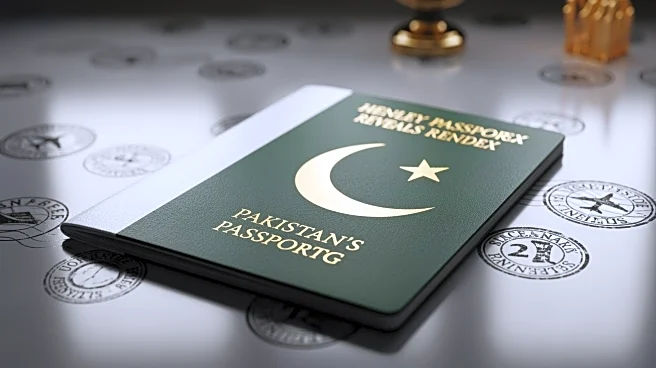What's Happening?
The Henley Passport Index's 2025 Global Passport Ranking has once again placed Pakistan's passport as the fourth least powerful in the world. This marks the fifth consecutive year that Pakistan has held
this position. The ranking, based on data from the International Air Transport Association (IATA), evaluates 199 passports according to their visa-free travel rights to 227 destinations worldwide. Pakistani passport holders currently have visa-free or visa-on-arrival access to only 31 countries, sharing the 103rd spot with Yemen. Neighboring countries have varied rankings, with China at 64th, India at 98th, and Iran at 85th. Singapore remains the most powerful passport, offering visa-free entry to 193 countries, followed by South Korea and Japan.
Why It's Important?
The ranking highlights the limited global mobility for Pakistani citizens, impacting their ability to travel for business, education, and tourism. This restriction can have broader economic implications, potentially affecting international trade and investment opportunities. The ranking also underscores the geopolitical and diplomatic challenges faced by Pakistan, as countries with stronger passports often have more robust international relations and economic partnerships. The comparison with neighboring countries like China, which has significantly improved its ranking, further emphasizes the need for Pakistan to enhance its diplomatic efforts and international standing.
What's Next?
Pakistan may need to explore diplomatic strategies to improve its passport ranking, such as negotiating visa-free agreements with more countries. This could involve strengthening bilateral relations and addressing security concerns that may hinder such agreements. Additionally, the government might consider reforms to enhance the country's image and stability, which could positively influence its global mobility ranking. Observers will be watching to see if Pakistan can make progress in these areas in the coming years.
Beyond the Headlines
The ranking also reflects broader issues of inequality in global mobility, where citizens of certain countries face significant barriers to travel. This can affect cultural exchange and international collaboration, limiting opportunities for Pakistani citizens to engage with the global community. The disparity in passport power can also influence perceptions of national identity and pride, potentially impacting domestic policy and public sentiment.










